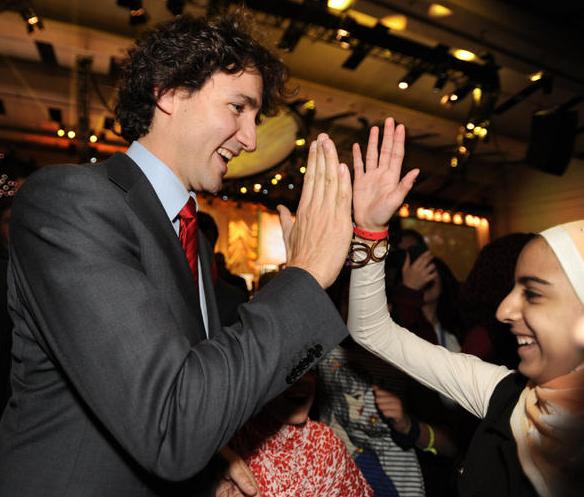Change the conversation, support rabble.ca today.
Much was made last month about Justin Trudeau’s keynote appearance at one of North America’s largest Muslim conferences. The conference has been accused mostly by sectors of the Canadian right-wing of being an “Islamist” venture.
The Toronto-based Reviving the Islamic Spirit (RIS) conference ended up accepting the withdrawal of one of its major sponsors, the International Relief Fund for the Afflicted and Needy Canada (IRFAN Canada), because the Canadian Revenue Agency concluded last April that the Mississauga-based organization funded “Hamas-linked” groups. IRFAN then had its charitable status stripped. The CRA’s allegations and conclusions are being challenged in court.
Of course, this is not the first time a bureaucracy under the Harper regime has sought to cripple an organization concerned with Palestinian human rights. The Canadian Arab Federation (CAF) and the ecumenical group KAIROS have all had parts of their operations hollowed out because of a willingness to highlight Palestinian suffering.
It’s all part of the Harper administration’s larger strategic plan to bring Canadian policy, both foreign and domestic, in sync with its Messianic and insular worldview, especially when it comes to the Middle East. But Muslims and Palestinians are not the only ones affected by this sprawling political arrangement.
Over 400 kilometres northeast of Toronto, Attawapiskat Chief Theresa Spence is in the fourth week of her defiant hunger strike. She’s protesting the Harper administration’s approach to ‘dealing with’ the worsening conditions on her reserve, and the concerted attack by the government on First Nations sovereignty, as embodied in official legislation (especially the omnibus Bill C-45).
Chief Spence’s protest can certainly be seen as a flashpoint within the broader Idle No More movement, perhaps one of the most promising and exciting national grassroots initiatives in the past ten years.
Indeed, the contemptuous attitude that the Harper administration displays toward the disenfranchised and underprivileged sectors of Canadian society has elicited much grassroots response from Canadian civil society. Idle No More can be seen as a major component of a series of grassroots reactions to the reactionary orientation of the Harper regime (from its handling of the G8/G20 protests to its slashing of refugee medical care).
One of the ways the government has struck back is by withdrawing federal money from NGOs that they don’t see eye-to-eye with. Groups that don’t receive large amounts of federal funding, like IRFAN Canada, are then put through the great smear machine of the Canadian right-wing, an informal but still somewhat coherent group of personalities.
Allegations that IRFAN Canada funded organizations under the control of Hamas are tenuous at best, especially when one looks closely at the Agency’s own documentation on the matter. The Harper government, of course, has trouble tagging what Israel does to the Gaza Strip with the same “terrorist” moniker they so enthusiastically give to Hamas.
Furthermore, the CRA’s actual proof for linking IRFAN Canada with Hamas is a case of very tenuous guilt-by-association. Of the 15 groups the humanitarian organization has given money to, each was designated as “terrorist” because (1) Israel finds it to be “unlawful,” (2) because it has personnel involved with Hamas as legislators, (3) because it’s a Hamas-governed bureaucracy, (4) because it publically “supports families of martyrs, resisters, and detainees” in the Territories, or (5) because it posted pro-Hamas videos online.
That’s the crux of the Agency’s beef with IRFAN Canada. Reasonable people can arrive at their own conclusions of whether these are good enough reasons to hollow out an organization that sponsors orphans in the embattled Gaza Strip, which has been under an illegal Israeli blockade since 2007.
Commentators like Tarek Fatah of Sun Media and others, viewed with a substantial dose of skepticism (if not downright contempt) by the larger Muslim community, have been largely successful in determining the borders of public debate when it come to issues concerning Muslim and Palestinian Canadians.
Almost the exact same script was followed when Citizenship and Immigration Canada, led by Jason Kenney, defunded CAF. Kenney’s main charge was CAF’s “anti-Semitism,” apparently a result of its willingness to point out the same Israeli crimes documented by groups like Amnesty International and Human Rights Watch, among others. KAIROS was no different, and involved former Minister of International Co-operations Bev Oda’s decision to “veto” the collective opinion of her entire bureaucracy to fund the ecumenical group.
One can say what one wants about the intellectual integrity of the anti-Muslim right-wing, but the fact that they have a substantial amount financial and infrastructural support for their “work” (shoddy as it may be) is unquestionable. Post-9/11, their agenda and ideological convictions have meshed well with the Harper worldview. Many Canadians have felt their venom, including the Muslim and Indigenous populations, whose public images are currently shaped in many ways by the myths and stereotypes perpetuated by the right.
At times, it’s better to ignore the smear tactics in order to move on. However, it’s important to recognize the extent of the disruption caused by the Canadian right. Time and again, they’ve shown their ability to smear serious organizations doing good work.
Given this reality, Canadian Palestinians and Muslims could use their own Idle No More moment.
Steven Zhou is a graduate student at Carleton University’s School of Journalism and Communication.
Photo: islamophobia-watch.com




